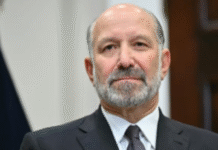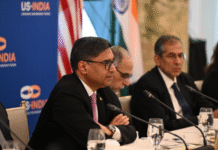New Delhi– Amid uncertainties regarding US President Donald Trump’s trade and visa policies, Prime Minister Narendra Modi has said that he shares Trump’s vision of prosperity for India and the US.
“I share with him the vision of prosperity of our peoples through a strong India-US partnership, based on important convergences, inter alia, in combating terrorism and promoting stability and development in the Indo-Pacific,” Modi said.
“I have met President Trump a few times,” Modi said in an interview to the Times of India ahead of this year’s Independence Day. “We have also been in touch through several conversations.”
India and the US, apart from Japan and Australia, are part of a quad that was revived last year to work for peace in the Indo-Pacific, a geostrategically important region.
Modi’s comments come ahead of the India-US 2+2 Dialogue next month in New Delhi involving External Affairs Minister Sushma Swaraj and Defence Minister Nirmala Sitharaman and their US counterparts Mike Pompeo and Jim Mattis.
In February, the Trump administration came up with a new visa policy that makes the procedure for issuing H-1B visas tougher.
According to the new policy, the hiring company would have to prove that its H-1B employee at a third-party worksite has specific and non-qualifying speculative assignments in speciality occupation.
In March, US President Donald Trump slapped import tariffs of 25 per cent on steel and 10 per cent on aluminium, unfolding the prospect of an all-out global trade war.
In retaliation, India raised customs duty on 29 products, including on iron and steel products imported from the US.
Stating that India and the US were two important engines of growth in the world, Modi said: “The focus of President Trump and our own priority in India on innovation and entrepreneurship has the potential to take this relationship to new heights.”
He stressed that the India-US Strategic Partnership had “deepened in an unprecedented manner in the past few years”.
India and the US share a Global Strategic Partnership based on shared democratic values and increasing convergence of interests on bilateral, regional and global issues. (IANS)






